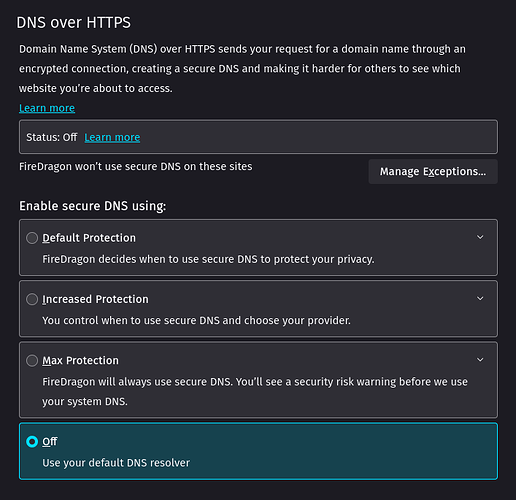Since the last update was my internet super slow.
I did jump back to an earlier snapshot, and it was still the same.
I figured now out, that it was the DNS Setting in Garuda Assistant.

Changing that back to Default from Cloudflare, fixed the issue.
Changing then back to Cloudflare, works again.
Some other people might experience the same, so this could work for you.
System:
Kernel: 6.4.12-zen1-1-zen arch: x86_64 bits: 64 compiler: gcc v: 13.2.1
clocksource: tsc available: acpi_pm
parameters: BOOT_IMAGE=/@/boot/vmlinuz-linux-zen
root=UUID=fdd9180e-818d-4cd6-8f82-b52c0fbaca7e rw rootflags=subvol=@
quiet quiet rd.udev.log_priority=3 vt.global_cursor_default=0 loglevel=3
ibt=off
Desktop: KDE Plasma v: 5.27.7 tk: Qt v: 5.15.10 wm: kwin_x11 vt: 2
dm: SDDM Distro: Garuda Linux base: Arch Linux
Machine:
Type: Laptop System: HP product: HP EliteBook 820 G3 v: N/A
serial: <superuser required> Chassis: type: 10 serial: <superuser required>
Mobo: HP model: 807C v: KBC Version 85.61 serial: <superuser required>
UEFI: HP v: N75 Ver. 01.05 date: 03/22/2016
Battery:
ID-1: BAT0 charge: 35.2 Wh (97.5%) condition: 36.1/36.1 Wh (100.0%)
volts: 12.8 min: 11.4 model: Hewlett-Packard Primary type: Li-ion
serial: <filter> status: not charging
CPU:
Info: model: Intel Core i5-6200U bits: 64 type: MT MCP arch: Skylake
gen: core 6 level: v3 note: check built: 2015 process: Intel 14nm family: 6
model-id: 0x4E (78) stepping: 3 microcode: 0xF0
Topology: cpus: 1x cores: 2 tpc: 2 threads: 4 smt: enabled cache:
L1: 128 KiB desc: d-2x32 KiB; i-2x32 KiB L2: 512 KiB desc: 2x256 KiB
L3: 3 MiB desc: 1x3 MiB
Speed (MHz): avg: 1465 high: 1500 min/max: 400/2800 scaling:
driver: intel_pstate governor: powersave cores: 1: 1496 2: 1382 3: 1500
4: 1483 bogomips: 19200
Flags: avx avx2 ht lm nx pae sse sse2 sse3 sse4_1 sse4_2 ssse3 vmx
Vulnerabilities: <filter>
Graphics:
Device-1: Intel Skylake GT2 [HD Graphics 520] vendor: Hewlett-Packard
driver: i915 v: kernel arch: Gen-9 process: Intel 14n built: 2015-16 ports:
active: eDP-1 empty: DP-1, DP-2, HDMI-A-1, HDMI-A-2 bus-ID: 00:02.0
chip-ID: 8086:1916 class-ID: 0300
Device-2: Cheng Uei Precision Industry (Foxlink) HP HD Camera
driver: uvcvideo type: USB rev: 2.0 speed: 480 Mb/s lanes: 1 mode: 2.0
bus-ID: 1-9:5 chip-ID: 05c8:0383 class-ID: 0e02
Display: x11 server: X.Org v: 21.1.8 with: Xwayland v: 23.2.0
compositor: kwin_x11 driver: X: loaded: modesetting
alternate: fbdev,intel,vesa dri: iris gpu: i915 display-ID: :0 screens: 1
Screen-1: 0 s-res: 1366x768 s-dpi: 96 s-size: 361x203mm (14.21x7.99")
s-diag: 414mm (16.31")
Monitor-1: eDP-1 model: LG Display 0x0498 built: 2015 res: 1366x768 hz: 60
dpi: 125 gamma: 1.2 size: 277x156mm (10.91x6.14") diag: 318mm (12.5")
ratio: 16:9 modes: 1366x768
API: OpenGL v: 4.6 Mesa 23.1.7-arch1.1 renderer: Mesa Intel HD Graphics
520 (SKL GT2) direct-render: Yes
Audio:
Device-1: Intel Sunrise Point-LP HD Audio vendor: Hewlett-Packard
driver: snd_hda_intel v: kernel alternate: snd_soc_skl,snd_soc_avs
bus-ID: 00:1f.3 chip-ID: 8086:9d70 class-ID: 0403
API: ALSA v: k6.4.12-zen1-1-zen status: kernel-api with: aoss
type: oss-emulator tools: alsactl,alsamixer,amixer
Server-1: PipeWire v: 0.3.79 status: active with: 1: pipewire-pulse
status: active 2: wireplumber status: active 3: pipewire-alsa type: plugin
4: pw-jack type: plugin tools: pactl,pw-cat,pw-cli,wpctl
Network:
Device-1: Intel Ethernet I219-V vendor: Hewlett-Packard driver: e1000e
v: kernel port: N/A bus-ID: 00:1f.6 chip-ID: 8086:1570 class-ID: 0200
IF: enp0s31f6 state: down mac: <filter>
Device-2: Intel Wireless 8260 driver: iwlwifi v: kernel pcie: gen: 1
speed: 2.5 GT/s lanes: 1 bus-ID: 02:00.0 chip-ID: 8086:24f3 class-ID: 0280
IF: wlp2s0 state: up mac: <filter>
Bluetooth:
Device-1: Intel Bluetooth wireless interface driver: btusb v: 0.8 type: USB
rev: 2.0 speed: 12 Mb/s lanes: 1 mode: 1.1 bus-ID: 1-7:3 chip-ID: 8087:0a2b
class-ID: e001
Report: btmgmt ID: hci0 rfk-id: 0 state: up address: <filter> bt-v: 4.2
lmp-v: 8 status: discoverable: no pairing: no class-ID: 7c010c
Drives:
Local Storage: total: 894.26 GiB used: 38.96 GiB (4.4%)
SMART Message: Unable to run smartctl. Root privileges required.
ID-1: /dev/nvme0n1 maj-min: 259:0 vendor: Patriot model: M.2 P310 480GB
size: 447.13 GiB block-size: physical: 512 B logical: 512 B speed: 31.6 Gb/s
lanes: 4 tech: SSD serial: <filter> fw-rev: EDFM90.0 temp: 25.9 C
scheme: GPT
ID-2: /dev/sda maj-min: 8:0 vendor: Kingston model: SA400S37480G
size: 447.13 GiB block-size: physical: 512 B logical: 512 B speed: 6.0 Gb/s
tech: SSD serial: <filter> fw-rev: 1103 scheme: MBR
Partition:
ID-1: / raw-size: 446.83 GiB size: 446.83 GiB (100.00%)
used: 38.96 GiB (8.7%) fs: btrfs dev: /dev/nvme0n1p2 maj-min: 259:2
ID-2: /boot/efi raw-size: 300 MiB size: 299.4 MiB (99.80%)
used: 576 KiB (0.2%) fs: vfat dev: /dev/nvme0n1p1 maj-min: 259:1
ID-3: /home raw-size: 446.83 GiB size: 446.83 GiB (100.00%)
used: 38.96 GiB (8.7%) fs: btrfs dev: /dev/nvme0n1p2 maj-min: 259:2
ID-4: /var/log raw-size: 446.83 GiB size: 446.83 GiB (100.00%)
used: 38.96 GiB (8.7%) fs: btrfs dev: /dev/nvme0n1p2 maj-min: 259:2
ID-5: /var/tmp raw-size: 446.83 GiB size: 446.83 GiB (100.00%)
used: 38.96 GiB (8.7%) fs: btrfs dev: /dev/nvme0n1p2 maj-min: 259:2
Swap:
Kernel: swappiness: 133 (default 60) cache-pressure: 100 (default) zswap: no
ID-1: swap-1 type: zram size: 7.42 GiB used: 0 KiB (0.0%) priority: 100
comp: zstd avail: lzo,lzo-rle,lz4,lz4hc,842 max-streams: 4 dev: /dev/zram0
Sensors:
System Temperatures: cpu: 44.0 C pch: 38.5 C mobo: N/A
Fan Speeds (rpm): N/A
Info:
Processes: 219 Uptime: 11m wakeups: 2 Memory: total: 8 GiB note: est.
available: 7.42 GiB used: 4.16 GiB (56.1%) Init: systemd v: 254
default: graphical tool: systemctl Compilers: gcc: 13.2.1 clang: 16.0.6
Packages: pm: pacman pkgs: 1355 libs: 334 tools: octopi,paru Shell: fish
v: 3.6.1 default: Bash v: 5.1.16 running-in: yakuake inxi: 3.3.29
Garuda (2.6.16-1):
System install date: 2023-08-19
Last full system update: 2023-09-09
Is partially upgraded: No
Relevant software: snapper NetworkManager dracut
Windows dual boot: No/Undetected
Failed units:
Hope this helps someone.
